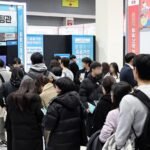Kim Tae-hyun, chairman of the National Pension Service
South Korea’s National Pension Service (NPS) will raise exposure to residential housing and data centers to take advantage of lower interset rates, which bodes well for the commercial property market, its chairman Kim Tae-hyun said on Wednesday.
In November, the world’s No. 3 pension scheme will commit a total of 600 billion won ($440 million) to two domestic property asset managers for commercial real estate lending, he said in a keynote speech for the global investment conference ASK 2024.
In the medim to long term, the NPS will diversify its real estate portfolio into biotech research and health care centers, as well as rental housing and protech facilities.
In the first half of this year, it had focused on exits from domestic office buildings struggling with high interest rates.
In the infrastructure sector, it will continue to chase core and core plus assets to secure a steady stream of cash flows to cope with increased geopolitical risks arising from the prolonged Ukraine-Russia war and tensions in the Middle East.
It is also looking to boost investments in value-added, secondaries and mid-market deals in the infrastructure market, he added.
MORE RESPONSIBILITY FOR GLOBAL OFFICE HEADS
The South Korean pension fund will allow its global office heads to take more active roles to speed up investment and partnership decisions, including buying equity stakes in asset management houses.
Last month, it opened a San Francisco office, becoming its fourth overseas outpost.
For private debt investments, it will expand into private lending, secondaries and equity investments in asset managers beyond the buyout-focused strategy.
This year, it allocated more than 3 trillion won to private debt, secondaries and equity purchases in general partners.
It will also raise exposure to mid-risk and growth capital markets, as well as distressed and niche markets in the long term to bolster returns in line with the Ministry of Welfare’s draft reform plan unveiled last month.
To delay the fund’s depletion, the ministry proposed NPS to increase investment returns by more than one percentage point on average.
The NPS manages 1,150 trillion won ($843 billion) in assets, the world’s third-largest pension scheme
By Yeonhee Kim
yhkim@hankyung.com
Jennifer Nicholson-Breen edited this article















